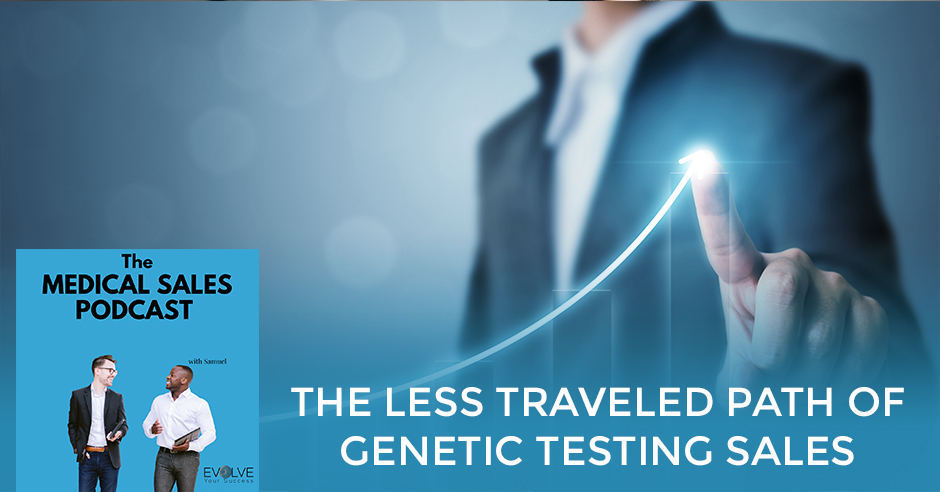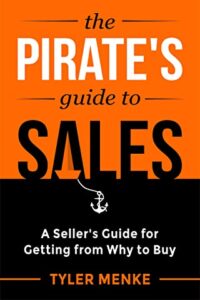
In this episode, Tyler Menke, Strategic Accounts Manager at Myriad Genetics, joins Samuel Gbadebo as they talk about the less-traveled path of genetic testing sales and what a potential career in the genetic testing space looks like. Tyler and Joshua dig deeper into genetic testing sales as Tyler gives an overview of this lucrative niche in the medical sales industry that acts as a quarterback within the health system. Learn how Myriad Genetics help to tailor a treatment and a prevention pathway to the individual based on your family genetics. Get to know Tyler’s journey and his experiences in the B2B world coming from device sales to his role at Myriad Genetics. Tyler and Joshua also discuss what it takes to become great in sales and the importance of patience for a driven individual.
—
Listen to the podcast here
The Less Traveled Path of Genetic Testing Sales
Tyler, how are you doing?
I am doing great, Samuel. How about yourself?
No complaints, just learning how to live in this new world we’re living in that hopefully is about to end.
Yes, I think we would all like to get back out there in some capacity sooner rather than later.
I’m going to let you go ahead and tell us where you’re from and what you do.
[bctt tweet=”Genetics is one of the rare products that exists that helps all three parties, company, patient, and hospital.” via=”no”]
It’s always the hardest question to start with for some reason. It may be tough to sum up in a short amount of time. I call myself a lifelong sales guy that has an entrepreneurial spirit. I am somebody who’s constantly learning. I enjoy learning, challenging myself, and taking on new endeavors. I work in a strategic account manager role for a genetics company. We work a lot in the Froedtert cancer space and personalized medicine with genetics. I’ve been doing that for years. Prior to that, I spent a good amount of time in device sales. That’s a little bit different world as you’re very well accustomed to. I’ve done a little bit of everything in the B2B sales world.
Look at you, you are making big moves. Your role, is that a sales role or is that a little different?
It’s like a hybrid manager sales role. We’ll come into a health system and pull from all the different divisions. We have an oncology division, a women’s health division, a neuroscience division, multiple different divisions within the realm of genetics. We act as the quarterback to help implement a genetics protocol within a health system. I’ll be the quarterback for the length of a project and it is sales. A lot of times, I’ll be the guy who comes in and does the C-Suite presentation.
To capture it in a nutshell, I want you to correct me if I’m wrong. You’re selling genetic protocol services to health systems.
What we’re selling is personalized medicine, but more importantly, it’s behavior change. You’re trying to take something that historically has been done in a systematic way in medicine and create a shift to where you’re not looking on patients based on their age or other risk factors. You’re looking at the individual patient based on their personal genetic makeup tailoring treatment and prevention to the individual.

Was this an education for your customers with technology? Are you implementing a system or software that they can use or is this more of how they do things and almost like a recommended way of doing things differently?
Both. With the advent of technology and interoperability, you’ve got the technology side where you have to have information, even if it’s genetic information readily available with any EMR. You also have to have information fed into EMR. There’s a lot of technical aspects to it, but primarily speaking, think of it in the realm of, I take your blood, Samuel. We send it off to our lab in Salt Lake City. Based on the panel of genetic testing that was done, the information that would come back would tailor a treatment pathway, a prevention pathway, maybe for cancer medications. We do a lot with antidepressants and tailoring not only the drug to the individual but also prevention.
How do you typically find your customers?
A lot of times, we have our brown troops and they do so much for us. They’re out there on the day-to-day in front of our customers building small protocols within offices or small group practices, and they’re finding interested parties. As that grows, they tend to bring a strategic account manager to try and tie up all the loose ends and speak to the C-level and get engagement from the hospital system as a whole. At that point, things take off. You can start seeing, go into primary care, OB-GYN, GI, oncology, and surgery. You’re implementing this within multiple facets of a hospital system.
Give me an example of the type of problem one of your customers would have that would make them say, “We need the type of solutions Tyler’s attached to.”
[bctt tweet=”Start small, and dream big.” via=”no”]
Genetics is one of the rare products that exists that helps all three parties, company, patient, and hospital or the provider themselves. As a patient, you want personalized information, and much of this is covered under the Affordable Care Act. As a provider or a hospital system, are you familiar with Triple Aim? If you think about what healthcare is now and where it’s headed, you’re trying to lower costs at the same time that you’re improving outcomes and driving and improving patient satisfaction. This is one of the rare products that you can do that without incurring a lot of costs. It’s very much a behavior change. It’s very much a protocol and a process. When it’s done correctly, you can reduce costs because every person you can prevent from getting cancer. You’re saving the health system a tremendous amount of money, which in turn is great for a patient. Are you a fan of all the mob movies?
Yes.
If you think about it, they rarely ever catch the mob boss. Usually, one of the underlings leads them to the mob boss. Hereditary cancer, which is where our company was founded out of, that’s often the case. You’ll find somebody, a patient, or an individual within a family where you find a dominant gene that’s causing all this cancer in their family. Half the people have the gene and half don’t. When you find that, it helps to solve the puzzle or the riddle that’s been causing this cancer in this family for such a long period of time. By doing that, you not only prevent that one cancer, but you’re also preventing a lot, 50% of an entire family in the first-degree world. If you think about it that way, you’re reducing costs, improving outcomes and increasing patient satisfaction, whether it be with threads or cancer or anything in the personalized medicine world because you’re tailoring things to the individual.
You’re mostly dealing with owners and C-Suites as opposed to the providers within maybe a medical practice.
It can go both ways. A lot of times, we’ll start in a small OB-GYN clinic or an imaging center. They’ll see the benefit of it and it will start spreading to different buckets within the health system. When I explain this as something that would take on a life of its own within GI primary care, everything I listed before, it would be impossible to do that at one given time. You sort of piece mail it and go specialty to specialty, office to office. A lot of times, you start small. It is like my tagline on LinkedIn, “You start small and dream big.”

I want to understand how you got there. Take us to the beginning. When you left college, what was your major? What was your interest? What happened after that? Give us the short and sweet of each step.
I originally wanted to be a doctor like my grandpa and a lot of my uncles, but I struggled mightily with school. I always made my way to an A or B-plus, but it was not without a ton of effort. Pre-med did me in. It was at that time that I had not uncovered learning disabilities, but I switched to business. Coming out of college, I never lost that passion for medicine. It’s something that’s deeply within my blood. I saw medical sales as an opportunity to marry two interests, business and medicine. You don’t ever break right into medical sales so I started off in a couple of different B2B ventures. Lo and behold, it was when I was trying to take one of those challenging entry tests at one of my first medical. You’re probably familiar with the test in training. I was in the training class trying to remember a bunch of anatomical terms and lots of data points in a short amount of time.
I was reminded of my struggles with school. I had a primary care appointment and I’m telling the primary care doc about this. He’s like, “Have you ever been tested for ADHD?” I’m like, “No. I thought that was only for hyper kids.” I was never a hyper kid, somebody that got in trouble. He said, “No, it manifests differently. Some people have a more hyper brain.” Long story short, I ended up being diagnosed late in life with ADHD. It wasn’t until my oldest son was tested in first grade that we found out that it’s ADHD and dyslexia, which are often very much aligned and common. For me, all the puzzle pieces fell into place. I couldn’t necessarily be a doctor. I got to a certain point when I did figure it out when I had kids and wasn’t going to go back to med school. This was an opportunity to marrying two interests.
You went business to business and you got into medical devices. What conditions were you working with when you first got into medical devices?
It was a role called the Surgical Sales Specialist. These roles will exist within companies. Sometimes you’ll have an associate territory manager, but often that’s within geography. What this was is if there was a maternity leave or somebody who had been fired or let go, you would fill in that open territory until the permanent person either came back or they found a permanent fill. I would travel around the country. I spent about two years in a hotel and I call it learning medical sales by drinking from a fire hose because that was right about the time that the vendor credentialing systems are coming out and there were about a dozen of them. With each new assignment that I got, I would have to go through all of the vendoring credential systems again and learn the hospitals, which are very complicated. They’re all like a maze. I would be running into ORs, nobody knows who I was, fresh and babyface. I learned a lot.
[bctt tweet=”There is no silver bullet to selling. There is a learning curve.” via=”no”]
You were thrown into the fire. How long were you in that? Was that your entire experience with medical devices or did you go to a few different roles with medical devices?
I did that role for about two years. They then gave me my own territory. I excelled and did well. We then acquired a couple of different products, so I got to learn a product launch and launched a couple of new products. We had my oldest son and I moved and got to take on another new territory and product. Through it all, there were six years or so in that role of device sales.
In six years, you’ve gotten to a level of proficiency with it. You were doing well to sell. What caused you to leave?
I like a constant challenge. I’m sure you’ve experienced and others out there that are reading, they run a life cycle and you get to a point with products where they’re very mature. A lot of times, you can ride that out for a while or you can say, “I want something new where I can make an impact.” I’m somebody that’s driven by impact. I felt like I was at that point where every product I carried in my bag was very mature. Genetics was something that was starting to explode. This was about the time that our company had the Angelina Jolie effect. She was diagnosed with being a carrier of the BRCA gene and that led to her prophylactic surgeries. She did a lot to create awareness around what the possibilities were with genetics and the cancer space. I thought that was great. There were a lot of changes happening. The hospitals are buying up all the physicians. Everything was becoming much more difficult to navigate. Your physicians had less leverage. I thought it was a great time to shift and it was.
What piqued your interest with your specific company? Did you say, “I like genetics, I want to get into that. I’m going to focus on making this move?” Did someone come to you or how does the opportunity present itself?

I had several people that I respected that work that had left my prior company. Talking to them, I came to believe quickly that it was something worth investigating. There was an open territory that became available in Cincinnati where I lived. It was perfect timing.
Was it pretty challenging to get the position or was it pretty much a shoe-in for you?
All the time, I’ve had interview processes. It was probably one of the easiest ones. It’s not a company that’s known for that, but I had done well in all of my roles and had people vouching for me. I think I had about one interview. At different times in your career, there are different levels of negotiation that happen. I was in a position where I could tow that line of tension and try to get terms that would be beneficial and less risky for me to make a move. It was one of those rare instances where I was able to move without as much risk.
Even within your role with the genetics company you work for, you’re clearly managing other people now. You’ve made it to excel there as well. You still made time to do things like write a book. Give us the name of the book. What inspired it and what did you learn while creating it?
I have two inspirations. The inspiration was out of frustration. I’m not sure what you or the readers believe, but the thought that we get trained on one method, whether it be challenger sales or spin selling, whatever the methods are that are out there. There is no silver bullet to sell. Anyone that tries to tell you that I think is being a little bit disingenuous. There is a learning curve and to me, if you look at my career path and trajectory, it was all either personal experience through those fire hose types of situations. More importantly, it was all those little experiences that taught me so much. Every experience or new assignment I had, particularly in the beginning, but with every shift of job and product, you learn from the best.
[bctt tweet=”The why is only important if you actually understand it. ” via=”no”]
I was driving down the road years ago, listening to a podcast. I’d already become a hyper learner because I’ve figured out this whole puzzle that caused me to not be able to learn that easily growing up. I heard a quote from Steve Jobs, “It’s more fun to be a pirate than joining the Navy.” They were talking about Apple. We think of Apple is the most innovative company in the world. I found it fascinating that Steve Jobs’ big thing was there is someone out there that knows better than you, how to do whatever you’re trying to achieve. Go learn from the best, bring it back and we’ll apply it in our own way and to our own system. That’s what I want to do with sales. I want it to be able to write and create something that would accelerate the learning process for anyone, whether they were in medical sales or not.
That’s what I did. I spent years researching different business books and interviewing top salespeople from around the country. I took all the best ideas and pirated them for the book. To answer your first question, what made me want to do it was the fact that, to me, if you’re learning and you’re challenging yourself and you’re feeling purposeful, that’s where the real joy of life happens. It’s one thing to learn a new skill, it’s another thing to practice a new skill, but to write about it and interview other people. I learned so much on this journey. Unbelievably, that’s powerful for me.
Give us the name of the book.
It is The Pirate’s Guide to Sales: A Seller’s Guide for Getting from Why to Buy. The why being your anchor. If you don’t lift the anchor, you never get anywhere.
I won’t spoil it for our readers. I read this book. It’s an excellent read. I highly recommend you guys to all check it out. You probably talk about this all the time, but I want to know what are the top three things, three lessons you learned as far as being a sales representative from your own experiences and from the people you interviewed when you wrote your book that you would say stand out? What are the top three that you would want anyone to keep in mind?

I would say the first thing that comes to mind and the way you phrase that question caused me to go here. The biggest lesson is the biggest piece of advice that has ever done wonders for me was to announce your goals. Make them public. I did it with a goal of quitting drinking for life and that’s a whole other episode. It’s something that has been tremendously powerful. We all want to be accountable to our own words and actions. When you publicly announce something, you strive to achieve that goal in a different way than if it’s a personal goal that you wrote down on a piece of paper and made with yourself. You have to do that, but when you tell other people, “This is my plan and goal,” in the people you respect, that holds you the fire. That would be the first thing.
The second thing is learning the why. We talk about it so much in today’s environment. It is only important if you understand it. You understand the person’s why, the business’ why. We still make a lot of assumptions, myself included. It’s only powerful to get to the why if you truly are getting to the root cause. The Simon Sinek’s of the world who certainly didn’t invent the why, but did a lot to create awareness around it. Lean Six Sigma and the Japanese, I’m sure there were others before them who did a lot to uncover the why. The analogy often used is to be the Undercover Boss, the brilliance in that show. Are you familiar with that show?
Of course, I am.
Hopefully, most of the readers would be, but the brilliance in that show is you’ve got a CEO and he or she comes in. They go to the ground floor of their company and they see exactly what’s happening. In Japanese terms, they call it the Gemba. If you watch that show, every time there they go back and they implement huge changes to their companies. There’s something to be said about getting to the ground floor and understanding as much as possible about what’s going on in the inner workings of the business or product that you’re selling on a very deep level. When you get to that place where you understand things like you’re going in as an undercover boss, that’s where you find solutions like you never thought possible. That’s the second thing, to be an undercover boss.
The third thing is I would implore everyone to be a pirate. If you see somebody in your company that’s an outlier and exceeding, inherently there’s something about us in sales where a lot of times, we’ll say, “It’s their territory. It’s their excuse for their success.” That may be the case, but don’t take that for granted. Call that person up and find out what they’re doing. More importantly, call people outside of your industry. Try to find the best outside your industry, see what they’re doing and what you can take from their system and apply it to yours. That’s something that has been tremendously powerful for me. Announce your goals, be an undercover boss, find the best and learn from the best.
In the vein of goals, what’s on the horizon for you? You want to continue to excel and thrive within your company. What’s one of those goals that are maybe 3 or 5 years out that you are working towards?
[bctt tweet=”Find the best and learn from the best.” via=”no”]
There’s something that’s happened in the last years that I can’t perfectly define. It’s a calling or a purpose to help others and the part that I can’t define is in what exact role or capacity that will be. I always have believed that it’s not the age of the car, it’s the miles. I’ve logged a lot of miles and had some crazy things happen along the way. I would like to be able to steer people away from some of that stuff and hopefully help people achieve their own goals, dreams, and passions. That’s something that I haven’t clearly defined how. That’s my loose goal.
I share some of those same exact goals. If you could go back in time and tell yourself one piece of advice going into everything you experienced when you came out of college or maybe even when you were leaving the medical device to go with the genetics, what would it be?
I would say patience. The more driven the individual is, the less patient they seem to be. Sometimes, and still I’ve failed this, but you need to let something simmer. I remember when I was getting married, one of my uncles said, “Whoever said never go to bed angry was full of crap.” Sometimes when you’re tired, the babies are up, the best is to go to bed and take a new fresh look in the morning when you’ve had some good sleep. The same thing goes in business. Learning to be patient or understanding the times when you need to be patient and let something simmer for a minute. I think that that’s something I would go back and tell myself. There are those moments that you need to understand. If you feel like you’re in one of those moments where you’re maybe being impatient or are not doing what is needed, that’s where you need to have a business mentor or coach that you can turn to.
Understanding when to be patient, that’s the key. For people that want to get into what you’re doing, I’m sure some readers heard this and thinking, “That sounds interesting,” what would you advise?
We have talked about this. It’s tailoring your personality and your passion to the purpose. That’s different for every person, but if you’re passionate about making a difference, passionate about healthcare, you always liked anatomy physiology. You are driven by helping people and patients. You’ve got to find a way to get into this world. There are so many great rewarding jobs. It’s not a role for somebody who’s trying to make money. I think the days of that are gone and that’s good. You shouldn’t be in any role just to make money in my opinion. If the passion is there, it comes down to how much you can stomach because there’s going to be a lot of uncomfortable transitions. We both know when you’re calling on doctors, they have long days, rough days.
Most doctors and hospital systems, they’re incredibly passionate people and compassionate people, but they have long hard days. You have to be willing to fight through uncomfortable times. Learn your craft wherever you’re at, be patient, try to excel above and beyond what everyone else is doing, document that, and keep fighting. Keep making connections, networking, and talking to people on LinkedIn. Make connections wherever possible and you’ll find your place.
Tyler, thank you for this and that you shared with our readers. It was great to hear from you and I hope to be talking to you sooner than later.
Important Links:
Love the show? Subscribe, rate, review, and share!
Join the Medical Sales Podcast Community today:



















































































